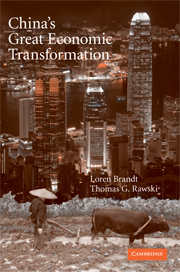Book contents
- Frontmatter
- Contents
- List of Figures
- List of Tables
- Contributors
- Acknowledgments
- Map
- 1 China's Great Economic Transformation
- 2 China and Development Economics
- 3 China in Light of the Performance of the Transition Economies
- 4 A Political Economy of China's Economic Transition
- 5 The Demographic Factor in China's Transition
- 6 The Chinese Labor Market in the Reform Era
- 7 Education in the Reform Era
- 8 Environmental Resources and Economic Growth
- 9 Science and Technology in China
- 10 The Political Economy of Private Sector Development in China
- 11 The Role of Law in China's Economic Development
- 12 China's Fiscal System: A Work in Progress
- 13 Agriculture in China's Development: Past Disappointments, Recent Successes, and Future Challenges
- 14 China's Financial System: Past, Present, and Future
- 15 China's Industrial Development
- 16 China's Embrace of Globalization
- 17 Growth and Structural Transformation in China
- 18 Income Inequality during China's Economic Transition
- 19 Spatial Dimensions of Chinese Economic Development
- 20 Forecasting China's Economic Growth to 2025
- Index
13 - Agriculture in China's Development: Past Disappointments, Recent Successes, and Future Challenges
Published online by Cambridge University Press: 24 May 2010
- Frontmatter
- Contents
- List of Figures
- List of Tables
- Contributors
- Acknowledgments
- Map
- 1 China's Great Economic Transformation
- 2 China and Development Economics
- 3 China in Light of the Performance of the Transition Economies
- 4 A Political Economy of China's Economic Transition
- 5 The Demographic Factor in China's Transition
- 6 The Chinese Labor Market in the Reform Era
- 7 Education in the Reform Era
- 8 Environmental Resources and Economic Growth
- 9 Science and Technology in China
- 10 The Political Economy of Private Sector Development in China
- 11 The Role of Law in China's Economic Development
- 12 China's Fiscal System: A Work in Progress
- 13 Agriculture in China's Development: Past Disappointments, Recent Successes, and Future Challenges
- 14 China's Financial System: Past, Present, and Future
- 15 China's Industrial Development
- 16 China's Embrace of Globalization
- 17 Growth and Structural Transformation in China
- 18 Income Inequality during China's Economic Transition
- 19 Spatial Dimensions of Chinese Economic Development
- 20 Forecasting China's Economic Growth to 2025
- Index
Summary
Economists' views of agricultural and rural development in the modern world have changed dramatically in the past several decades. Traditionally, agriculture was seen as an inferior partner in development. Since the size of the sector falls during development, economists proposed a policy of benign neglect. Why should nations invest in a shrinking sector? Some academics urged policymakers to treat agriculture like a black box from which resources could be costlessly extracted (Lewis, 1954). They recommended directing all investment toward industry and the cities. As a low-productivity sector, agriculture did not deserve attention.
Countries that followed such advice sometimes achieved brief gains, but soon learned that neglect of the farm sector slowed the pace of growth and often led development efforts to fail (Timmer, 1998). Neglect of agriculture excluded a large part of the population from the development process. Without investment in agriculture, it was difficult to redeploy rural resources to support faster-growing segments of the economy. Without rural investment, dualism flourished, and agricultural production often fell, pushing food prices up. Many households fell into isolated subsistence. This undermined the stability that growth requires, causing development to stagnate or even go into reverse.
Many countries encountered these difficulties: Argentina, Mexico, Nigeria, and even to some extent, the former Soviet Union. In contrast, during the last century, nations that grew fast and entered the ranks of developed nations – notably, Japan and South Korea – emphasized heavy investment in agriculture as an integral part of their development strategy.
- Type
- Chapter
- Information
- China's Great Economic Transformation , pp. 467 - 505Publisher: Cambridge University PressPrint publication year: 2008
- 20
- Cited by



